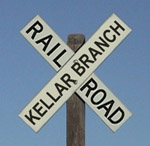 “Results of two public hearings showed overwhelming support for a recreational trail, Mayor Mark Allen said Tuesday,” according to a report in today’s Journal Star. Thus, the Heights will be sending a letter expressing their renewed support for the Park District’s push to eliminate rail service to Carver Lumber and future rail-served businesses in Pioneer Park.
“Results of two public hearings showed overwhelming support for a recreational trail, Mayor Mark Allen said Tuesday,” according to a report in today’s Journal Star. Thus, the Heights will be sending a letter expressing their renewed support for the Park District’s push to eliminate rail service to Carver Lumber and future rail-served businesses in Pioneer Park.
While disappointing, this comes as no surprise. It would be very hard for a small municipal body like the Heights to go against the Park District/RTA (Recreational Trail Advocates) machine. The Kellar Branch topic has become so politically charged and the court of public opinion so tainted by disinformation from the Park District, RTA, and Journal Star that it’s practically impossible to get a fair hearing on it anymore.
That’s why there exists a federal agency called the Surface Transportation Board (STB).
It’s the policy of the U. S. Government, among other things, “to ensure the development and continuation of a sound rail transportation system with effective competition among rail carriers and with other modes, to meet the needs of the public….” So, they want to see shippers continue to be rail served, and they want them to get competitive shipping rates. Rail conserves energy, reduces the number of trucks on the streets (which saves money in highway maintenance), and is better for the environment. The government wants to encourage that.
In this case, Peoria and Peoria Heights are the owners of the railroad, and they want to replace their current carrier (Pioneer), which up until August 2005 had been providing good service at reasonable rates by all accounts, with a new carrier (Central Illinois Railroad), which has proven to provide inadequate service — if any — at exorbitant rates. The service and rates are so bad that it’s actually more economical for Carver to transload their material and truck it to their facility in Pioneer Park.
Why would the Cities want such an inferior rail carrier? Because they’re not interested in providing rail service. They want to rip out the railroad and put in a recreational trail. That flies in the face of the nation’s transportation policy.
It is true that the federal government also supports the creation of recreational trails on abandoned railroad beds. But that’s only if the rail line is not being used, and its primary purpose in many cases is to preserve the rail corridor for possible future use. In other words, it’s the government’s second choice. Its first choice is that rail service continue.
In city council and village board meetings, the fate of railroad service may be decided on the basis of a popularity contest. But it doesn’t work that way on the Surface Transportation Board. They conduct a more objective balancing test to protect shippers from arbitrary and capricious cuts in service by railroad owners.


 Since April 2006, the City of Peoria and Insight Communications have been operating without a franchise agreement. The old 20-year agreement expired last year and negotiations for a new agreement have been going on ever since. The City isn’t saying what the holdup is, although it could be any number of things, including state and federal legislation designed to take local franchising authority away from home-rule communities like Peoria.
Since April 2006, the City of Peoria and Insight Communications have been operating without a franchise agreement. The old 20-year agreement expired last year and negotiations for a new agreement have been going on ever since. The City isn’t saying what the holdup is, although it could be any number of things, including state and federal legislation designed to take local franchising authority away from home-rule communities like Peoria.